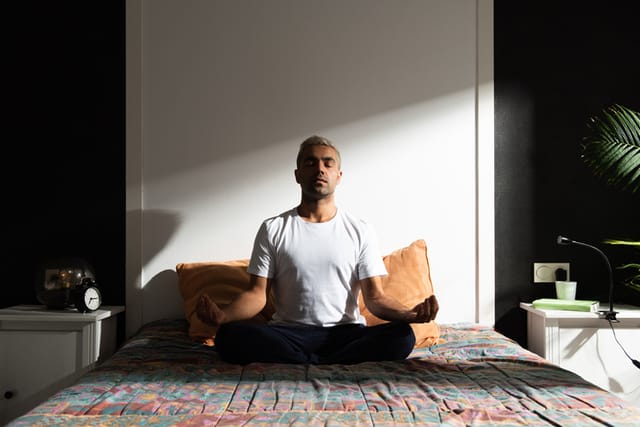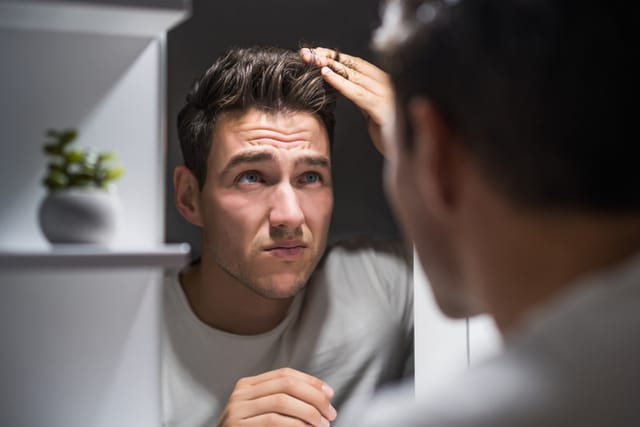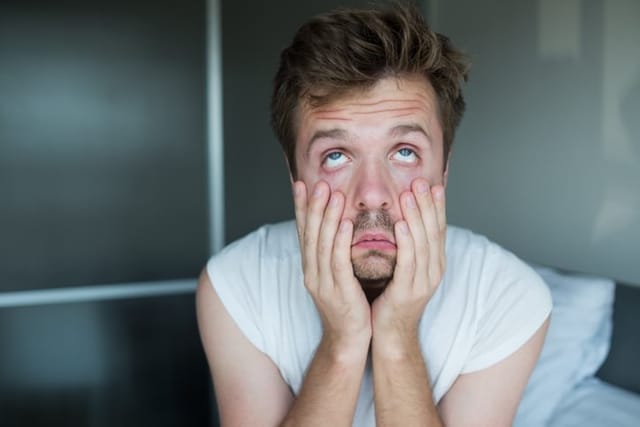According to the World Health Organization, roughly 4% of the global population has a diagnosed anxiety disorder. While that doesn’t seem like a lot, remember, that’s people who’ve received a diagnosis. The U.S. Census Bureau provides a little more context, revealing that more than 40 million American adults, or 19.1% of the population, have anxiety. And while the symptoms and side effects that come along with it can be felt by anyone regardless of age, sex, gender, etc., anxiety can manifest differently in men. Keep an eye out for these behaviors — they may mean the guy in your life needs a little bit of help.
1. Obsession with fitness

For some men, anxiety doesn’t present as nervousness or worry but rather through an intense focus on physical fitness. They might spend hours at the gym, obsess over their diets, or constantly track their fitness progress. While on the surface, this might look like dedication to health, it can be a way to manage feelings of anxiety. This obsession can provide a sense of control or a distraction from underlying anxious thoughts.
2. Unexplained aches and pains

Physical symptoms like random aches and pains can be a surprising indicator of anxiety in men. They might complain about back pain, headaches, or muscle tension without any clear medical cause. Often, these physical manifestations are the body’s response to stress and anxiety. They might not even realize that these pains are connected to their mental health, dismissing them as just random bodily quirks.
3. Sudden disinterest in things they used to love

A sudden loss of interest in activities they used to enjoy can be a subtle sign of anxiety. It’s not just about feeling blue; it’s a shift where things that once brought joy now feel uninteresting or overwhelming. This change can be gradual, and they might not even notice it’s happening. It’s like the anxiety is casting a shadow over parts of their life that used to be full of color.
4. Over-preparation for everyday tasks and activities

Anxiety might lead some men to over-prepare for routine activities. They could spend excessive time planning a simple outing or rehearsing for a basic meeting. This behavior is about alleviating the anxious feeling of not being in control. By over-preparing, they feel they can handle anything unexpected, but it’s really just a way to soothe their anxiety.
5. Sleep disturbances or insomnia

Trouble sleeping can be a subtle yet significant sign of anxiety. They might have difficulty falling asleep, wake up frequently during the night, or experience restless sleep. It’s often because their mind is racing, unable to shut down due to anxious thoughts. While everyone has a bad night’s sleep now and then, consistent patterns of sleep disturbance can be an indicator of deeper anxiety issues.
7. Wanting to be alone more than usual

Men grappling with anxiety might start to seek out solitude more frequently. It’s not just about needing a break; it’s more like they find being alone less stressful than socializing. They might retreat to their room or garage, any place where they can be by themselves. This increased need for solitude is their way of managing overwhelming feelings. It’s a quiet retreat from the expectations and social dynamics that heighten their anxiety.
8. Becoming overly superstitious or ritualistic

Anxiety can lead to the development of new superstitions or rituals. Men might start having specific routines they feel compelled to follow, like wearing a lucky shirt to every important meeting. These behaviors often stem from a belief that the ritual will somehow prevent bad outcomes. It’s a way of trying to control the uncontrollable, a direct response to the helplessness that anxiety can evoke.
9. Hyper-awareness of their health (or fear of health problems)

A less obvious sign of anxiety in men is a sudden hyper-awareness or concern over personal health. They might start interpreting minor physical sensations as signs of serious illness, leading to frequent doctor visits or health research. This behavior reflects the heightened state of alertness that anxiety can cause, turning everyday aches and pains into sources of worry.
10. Exaggerated startle response

Men might jump at sudden noises or movements that wouldn’t have bothered them before. This heightened reaction is due to their nervous system being in a constant state of alert, a common symptom in those dealing with anxiety. It’s like their body is always braced for something to go wrong, even in safe and familiar environments.
11. Avoiding eye contact

Men dealing with anxiety might start avoiding eye contact more than usual. It’s not about being rude or disinterested; it’s an unconscious reaction to feeling exposed or vulnerable. During conversations, they might look away frequently or seem distracted. This avoidance is a physical manifestation of the discomfort and internal turmoil they’re experiencing. It’s a subtle but telling sign that engaging directly with others is becoming increasingly difficult due to anxiety.
13. Overanalyzing jokes and casual comments

Men with anxiety might start to worry about hidden meanings or implications of the most random things people say. A throwaway comment from a colleague or a teasing remark from a friend can become a source of prolonged worry. They might replay these interactions in their mind, trying to decipher if there was a negative subtext or if they responded appropriately. This behavior reflects the constant state of alertness and overthinking that accompanies anxiety.
14. Procrastinating on important tasks

Anxiety can lead some men to procrastinate on tasks that they typically would handle promptly. It’s not just garden-variety avoidance; it’s an anxiety-driven delay. Important tasks, especially those requiring decision-making or social interaction, can seem daunting. Procrastination becomes a temporary escape from discomfort and pressure. This behavior contrasts with their usual approach and often goes unnoticed as a sign of underlying anxiety.
15. Increased physical restlessness or fidgeting

Subtle physical signs like restlessness or fidgeting can indicate anxiety. This isn’t the usual foot tapping or drumming of fingers due to boredom. Instead, it’s more constant and pronounced – pacing around the room, unable to sit still, or fidgeting incessantly during conversations. These actions are physical outlets for the nervous energy created by anxiety, even if they’re not consciously aware of feeling anxious.
Like what you’ve read? Follow Bolde on MSN for more!



